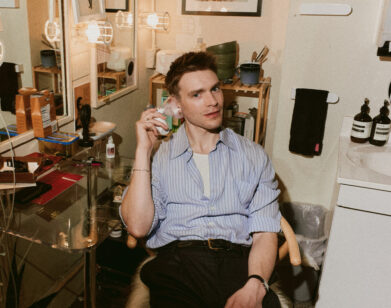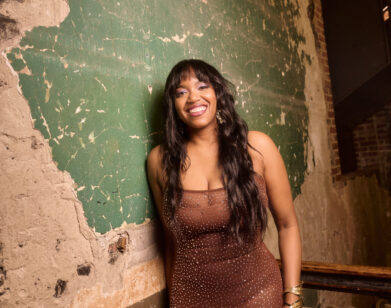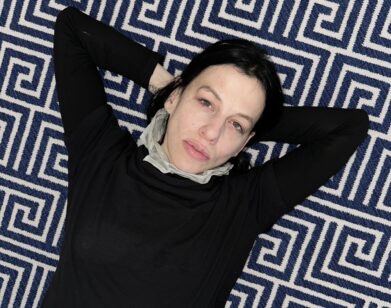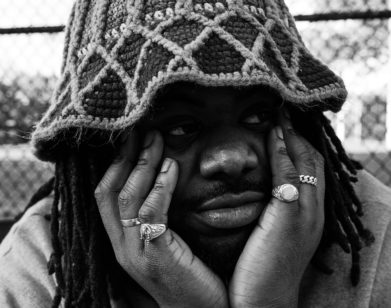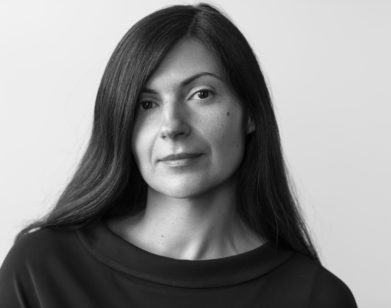HE SAID SHE SAID
How Succession’s Harriet Walter Imagined Alternative Lives for Shakespeare’s Women
In her latest Shakespearian literary venture, acclaimed stage actress and Succession mother dearest Harriet Walter gives voice to the Bard’s unsung female characters. Building on her longtime involvement in all-female Shakespeare productions at St. Ann’s Warehouse in Brooklyn, Walter brings her acute knowledge of Shakspearean language along with her signature insight and wit to a collection of inventive, brand-new soliloquies delving into the complicated psychology of Shakespeare’s women, from the perplexing attraction between Lady Anne and Richard III to the complex, gender-bending romance of Olivia in Twelfth Night. Just after the book’s publication, Walter sat down with fellow poet and writer Jonathan Wells, whose debut novel The Sterns Are Listening published last year, to discuss the magic and frustrations of communing with infamous archetypes and their shared fascination with the uncertainty that poetry demands from the reader.—JULIETTE JEFFERS
———
JONATHAN WELLS: How long have you been coming to New York?
HARRIET WALTER: I first came in 1983 to do All’s Well That Ends Well on Broadway with the Royal Shakespeare Company, directed by Trevor Nunn. I was already 32 and had never been to the United States, so that was quite late in life. It was a little known Shakespeare play—they didn’t dare put “Shakespeare” on the poster. It said “From the writer who brought you Romeo & Juliet,” since Trevor had a big hit with Nicholas Nickleby the year before. Frank Rich commented on the London production, saying it was wonderful but that no New Yorker would get to see it because they don’t put on long Shakespeare plays commercially. That triggered Trevor and others to prove him wrong. It was a critical success but not a commercial one. But it was thrilling for me. People like Laurence Olivier and Douglas Fairbanks came to see it. That happens in New York—famous people watch you, which is exciting. I remember first meeting Jane years later when David came to see us do Mary Stuart on Broadway in 2009. They said to come have supper, and not knowing Jane’s surname, I asked the restaurant what table to ask for. They said, “Are you on Miss Bacall’s table?” Of course, Lauren Bacall had been to our show. It was so glamorous.
WELLS: Wow. Do you like coming to New York?
WALTER: I did. In ’83, I shared a Tribeca loft with my painter friend. We went up the World Trade Center and got photos from the top. We were a bunch of Brits let loose on the city with all the enthusiasm of that age. Then in the early ’90s, I came over with Three Birds Alighting on a Field to the Manhattan Theatre Club. It had been a hit at the Royal Court in London but wasn’t quite the right audience here. I was the only Brit with an American cast who all had to play British. It was different living alone in an apartment they set up while everyone else went home. We weren’t out rampaging till 3 a.m., but I made some friends. The next time was Mary Stuart, starting at the Donmar Warehouse. They invited Janet McTeer and me to repeat our performances with an American cast. That’s where I met Guy.
WELLS: I didn’t know that. You’ve seen the city and theater change a lot over the years. When did you first work at St. Ann’s Warehouse?
WALTER: St. Ann’s was in a temporary place at the bottom of Water Street. It was exciting doing the all-female Shakespeare trilogy. A lot of the young cast had never been here and ran wild. We did the groundbreaking for the new building and performed “O for a Muse of Fire” from Henry V, talking about the “wooden O” representing Agincourt. It was appropriate in the grounds of a new theater. Also, at the time, the mayor said he didn’t want us to do Julius Caesar. I realized why– he looked like a little Caesar up there himself.
WELLS: Because of the all-female cast, did that require much more preliminary thought and debate than most plays? I thought the insight into how a play gets presented and how an actor thinks of portraying a character was fascinating. I’m an amateur, though.
WALTER: It’s a good question. There are almost as many methods as directors. The requirements are so different, with no template I’ve managed to transpose to another job. We had quite a few inexperienced Shakespeare actors, so we hammered out what the plays meant for a while. We did great movement work with Anne Yee, a movement choreographer and director. We weren’t going to imitate men or swagger around, but get behind why men feel entitled to take up space. That translated into how we moved, worked together, and the postures we used. You realize a lot of it is posturing. We sort of decide how to present ourselves. And one great thing was wearing unflattering prison garb without makeup. It was releasing; so much of a female actor’s work is “how do I look?” We didn’t have to worry about crossing legs in a short skirt or which side was our better profile. We were released from that so, in a way, there was less work.
WELLS: How did critics react? I remember packed houses.
WALTER: It had been well-received in London, which helps as you usually don’t get invited unless your show’s been a hit there. I’ve never done a homegrown thing here. We had a history starting in 2012, always coming to St. Ann’s the year after. The difference in attitude from critics and audiences over those five years was marked. At first there was this defensive “why are these women doing this?” from male actors. By the end, we had people saying it was great. Men felt released from posturing. Something comes into relief when played against gender, color, or age. The thing being avoided becomes bigger than normal. You wouldn’t notice a male actor swaggering around saying “I’ll kill Caesar,” but you notice it with a woman. She’s still playing a man but highlighting the activity and attitude rather than taking it for granted.
WELLS: Chan Marshall, an American singer, did her own rendition of Bob Dylan’s famous Albert Hall concert where he went electric. She did the songs in sequence, going electric when he did. I thought it was fascinating to hear her interpret songs he’d written. A music critic friend of mine said, “No, it’s a disaster.”
WALTER: It’s much harder for someone to usurp or obliterate that, as it’s something people already love. With Shakespeare, the plays have been done a zillion times in different ways. You just make a little dent for one year, then people go back to how they’ve always done it. But it’s interesting you say it expanded the songs. Did she interpret them as well?
WELLS: I thought so. Her phrasing was fascinating. That makes me think of the letter you wrote to Shakespeare in your book Brutus and Other Heroines. You talk about the shortage of female characters. And your new book seems to fulfill your own address to him.
WALTER: You pointed that out to me. I hadn’t consciously thought that, but it’s a continuum, always in dialogue with Shakespeare. There’s a paradox where you feel you’ve swum in his head, spoken his thoughts, heard his heartbeat, yet we don’t know the man, how he sounded, looked, if he was friendly or funny or moody. He’s open to anybody’s possession. I felt I could write to him as I’d been talking to him for years, but it was one-sided. Writing it out, the frustration remains that I’ll never have that conversation with him. It was a fantasy, a letter to the readers. You know it won’t reach his ears but it’s what I wanted to say—my deep regret loving this guy and his works, but he hasn’t expressed quite what I want as he hasn’t told the female side of the story, and certainly not the modern female one. That was 2016, so it didn’t lead directly to sitting down to write She Speaks! But it is my attempt to fulfill some of that. They’ve become thought of as performance pieces, though I wrote them just to speak my thoughts through his rhythms and to frame questions I want to ask now through Shakespearean language. I have Olivia in Twelfth Night falling in love with a woman, Cesario, as she’s seen through the disguise. Women’s love for women wasn’t really on the menu then. Shakespeare hints at male love for males but practically never lesbian attraction. So I thought, with this ambiguous Cesario/Viola, which bit is Olivia falling for? The male or female side? That was my language to examine that question, which others will do in other ways.
WELLS: The gender confusion also feeds into women not being allowed on stage in Shakespeare’s time, with roles played by boys. You talk about how that limited women’s speeches and that Shakespeare had favorite boys he wrote for.
WALTER: That’s me speculating based on essays I’ve read. Most of it is just guesswork. But he was a company man, writing for the talents in his company. The question isn’t so much how few female parts [there were], but isn’t it amazing they’re as good as they are? I thought it must be because some of the young boys were marvelous. We tend to look at it through too modern a lens. In 16th century London, theater as an art form was new. It wasn’t lots of theaters with a big pool of actors like now. The best wouldn’t necessarily be great, more like an amateur regional opera company. There’d be a handful of apprentice boys learning their craft playing girls then moving on to Hamlet. Their function is pretty much always in relation to the male story. There are no title roles for women. They share billing in Romeo and Juliet, Troilus and Cressida, Antony and Cleopatra. It’s kind of sad. That’s partly why I wrote the letter.
WELLS: It’s interesting how you frame the characters before each speech you write, giving a synopsis of the play and what’s happening. For people like me, who haven’t read or seen much Shakespeare recently, it instantly puts me in the moment to read your created speech. I wrote out a couple of my favorites, like the Ariel sonnet, which I found particularly successful and beautiful. Do you want to read it?
WALTER: Thank you. That’s one of my favorites too.
WELLS: Why is it a favorite?
WALTER: It describes the ephemeral nature of being and acting. Shakespeare uses acting and theater as metaphors in some sonnets. I found, “Do we want to be free?” That’s Ariel’s whole thing. He wants freedom, but does he want to be set free from love’s ties? If you love, you are tied in some way. We long for freedom but it’s loveless. It felt personal but also appropriate for the character.
WELLS: The Ariel sonnet felt more like a poem on the page than a speech. It has an alternating ABAB rhyme scheme rather than AABB, and you’re less conscious of the rhymes hitting you over the head. In AABB, the rhymes clobber you. But you used very diverse aspects of poetry in creating these speeches. Some are rambunctious and bawdy, some in blank verse, many don’t rhyme. You really used a broad palette of poetic devices.
WALTER: It’s interesting, because I first thought of them as poems, or some of them. I didn’t think they’d be spoken. But because I was following the impulse of a character to express something, I realized they are speeches. Sometimes, like the piece I wrote for Cressida with no rhyme at all, I kept thinking, “This sounds really discordant, I want the structure.” I got scared doing it without rhyming, and it sent me out rather nakedly into the poetic world. Unless I was doing Miranda, who felt she should have absolute free form, “fuck everything,” because that’s the character. That was the nearest to just coming up with metaphors I wanted to explore.
WELLS: That one really appealed to me, both because it’s about the nature of love but it’s also about acting and all that. You also read my book, The Sterns Are Listening. It couldn’t be more different to what you’ve done. What did you make of it?
WALTER: What struck me as interesting is that I’ve read your more personal autobiography, The Skinny, and quite a lot of your poems, which I think are sensational. So I thought, “How much overlap will there be between the poet, autobiographer and novelist?” To begin, I didn’t see much overlap. I thought, “Oh, he’s venturing into unknown places.” I felt a bit rootless and untethered, not knowing where I was heading, but I couldn’t stop reading it. I went with it. These were people I don’t really recognize. I don’t know many Sterns or anyone who pretends to be Italian. BUT I marveled at how you, as a writer, can create a world, a story, but also an environment, a smell, a taste, a music, sounds, things that are not mine but that you’re sharing and I’m traveling around in. I got more and more into it when the two stories started to come together. You do spend a certain amount of time in a novel going, “Where’s this going? Give me some orientation.” Whereas an autobiography, you know where it’s going. And with poems, you don’t expect to know where you are. You have to live with uncertainty for a bit. I always have to read your poems two or three times. It’s not something I’m going to read through like a novel. But I did get totally intuitive with the book and very much enjoyed it. Did you write out strands and millions of notes on the wall? Everybody has a different way.
WELLS: I could only do 500 words a day, but I had some idea where I thought it would end up. I always had this pretentious idea of Ulysses and Telemachus; the son searching for the father, managing the home, hoping to bring the father back from his trip to Troy. But in my version, the son doesn’t find the father. The son has something to teach the father.
WALTER: Did you at any point go up a completely different road and come back?
WELLS: Nope.
WALTER: What I found interesting was the protagonist’s father, Benjamin, being an older brother. It seems so strange a younger brother would have so much control over an older brother, speaking as a younger sister.
WELLS: A lot of that control has to do with the narcissism and the power the younger brother exerts, not only on his brother but in the company he works and people he deals with, the capriciousness of his narcissistic instincts and urges. I wanted the father Benjamin to benefit from what his son had learned away from the family. Looking back on the book now, I wish I’d been able to find solutions I couldn’t in the writing, in the resolution. There’s duplication in scenes at the end where I couldn’t figure out a way around without giving it away. By the way, in your book I was struck by Richard III and Lady Anne. You specifically talk about Richard’s narcissism and the chutzpah of convincing a woman whose husband and father-in-law he killed to fall in love with him.
WALTER: Lady Anne was the very last one I wrote. I’d written a version of “All the World’s a Stage” way back that the publishers wanted to include. I wasn’t happy with it—it was written over the original’s print, not a new speech, just the woman’s version. My publisher said to let somebody read it. One of the first reactions was, “I don’t think that one belongs.” It was very late in the day. I thought, “Oh good, I don’t think so either.” Then, over that weekend, I wrote Lady Anne, because I had to write another one. There had to be 30. I remember seeing that play, never enjoying it, hating Richard III getting all these charismatic speeches, almost loving him and loving to hate him. As I said in the essay before, the engine of the play is Richard’s hunger. We can’t stop and ask why Anne is turned around like that. So often in productions that scene is cut way down.
WELLS: Interesting.
WALTER: The other women are cut way down too, because the main drive is Richard. But then it becomes empty. This guy wants to be king, kills off a lot of people, becomes king, then dies. Of course, there’s more to it than that. But I want to know about all the other people.
WELLS: I thought the speech you wrote was trying to understand Anne and her attraction to this man. What would bring her to this point? You have the line, “A strange attraction to my mirrored itself.” I thought that was so interesting, because she saw something resonant in him.
WALTER: Yes. I also said in the essay before that in performance it will never make sense unless the actors have a certain chemistry. It can’t be explained as anything logical. She’s not after anything, she’s not going to get anything from him. It’s too late; she’s lost her husband and father-in-law. If she was that kind of character, she’d accept his marriage offer just to survive. But I don’t think that’s all there is to it. I’ve never seen it very successfully performed.
WELLS: Really? You’ve never played Lady Anne?
WALTER: I’ve never played her. But one casualty of Shakespeare productions, tipped towards male predominance, is the female scenes get cut down. You don’t get as strong an actor to play the females because it’s not as rewarding for an A-list actress. You get this short-changing sometimes in the female roles, which perpetuates the lack of importance. I don’t want to insult, and I’m sure there have been brilliant Lady Anne’s. I just haven’t seen one that really made me understand that scene.
WELLS: Where the chemistry is—
WALTER: It’s that side of attraction that’s also revulsion. This mirrored self, you are drawn to what he’s seeing in you, which is all performative. It really lends itself to something going on between two actors. It doesn’t make sense otherwise. He’s got that horrendous drive of the rejected man, almost like an incel. He’s convinced himself he’s hideous, the world has rejected him, so he’s going to gather up all that self-loathing and turn it into charisma. What I love about doing the speeches is when I’d suddenly get something like the word “mirror.” He talks about how he looks in the mirror in his soliloquies and sees this hunchback thing. I didn’t have to look for some of these images. Thinking about the play, certain images came up.
WELLS: Wow. And what better place to end than on inexplicable chemistry?
WALTER: That’s very good.


